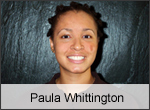
Paula J. Whittington knew she wanted to make a difference in peoples' lives, but she didn't expect to have such a major impact so quickly.
Ms. Whittington, a student in the Wayne State University School of Medicine's M.D./Ph.D. program, played a major role in the development of what may one day become a vaccine for a certain type of breast cancer.
Working in the lab of Wei-Zen Wei, Ph.D., professor of Immunology and Microbiology at the School of Medicine, Ms. Whittington found herself in at the center of research expected to one day touch every woman in the United States, if not the world.
Ms. Whittington received lead author honors on the study announcing the potential vaccine, published in the Sept. 15 issue of Cancer Research, a journal of the American Association for Cancer Research.
The vaccine, Ms. Whittington and her co-researchers said, completely eliminated HER2-positive tumors in mice, without any toxicity. The study suggests the vaccine could treat women with HER2-positive, treatment-resistant cancer or help prevent cancer recurrence. The researchers also said it could potentially be used in cancer-free women to prevent initial development of these tumors.
"That's pretty exciting," Ms. Whittington said. "To think that I was given the opportunity to play a part in a potential vaccine that could mean so much to so many women … it's hard to imagine."
As the lead author, she helped generate the hypothesis of how the vaccine would work in an animal model system. She performed most of the experiments and data interpretation.
"My initial interest was in the use of immunotherapy to curb graft rejection in transplant patients," Ms. Whittington explained. "Dr. Wei's research parallels this idea by using DNA vaccination to break tolerance to HER2."
The discovery, and the attention it garnered, brought School of Medicine researchers to the fore as their story swept around the world.
"Researchers are generally behind the scenes. A doctor helps a patient and receives thanks, and that's expected, but people don't really know the researchers. But when this came out I received thanks from a number of people, even though the vaccine isn't yet available. One woman thanked me because her mother has breast cancer. She wanted to thank me just for working on it," Ms. Whittington said.
Originally from Upper Marlboro, Md., Ms. Whittington, 28, was a Meyerhoff Scholar at the University of Maryland, Baltimore County, where she received a bachelor's degree in biology. She has already earned her doctorate degree and continues work on her medical degree. The paper she co-wrote that received so much recent media attention was vital to her thesis work.
"I have always been fascinated with the human body," Ms. Whittington said. "I also wanted to make a difference in peoples' lives, so naturally medicine was a perfect career option."
Ms. Whittington said she entered the School of Medicine's M.D./Ph.D. program to "contribute to the advancement of clinical medicine through basic science research."
She is interested in a career in surgery after completion of the program, but continues to explore interests as she rotates through clerkships.